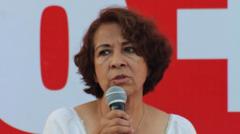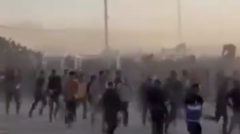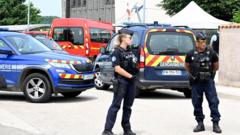As Ecuador heads to the polls, voters confront tough choices on leadership amidst rising violence and a fractured justice system.
Ecuador's Presidential Election: A Battle Against Drug-Related Violence

Ecuador's Presidential Election: A Battle Against Drug-Related Violence
Ecuador's runoff election sees candidates vying to tackle an escalating security crisis linked to drug trafficking.
Ecuador is gearing up for a pivotal runoff presidential election this Sunday, with candidates addressing the rampant violence associated with the drug trade. President Daniel Noboa, who has been in office for 16 months, is seeking re-election against Luisa González, a candidate backed by former president Rafael Correa. The election is critical, as both candidates present contrasting approaches to addressing the nation’s growing security crisis fueled by drug trafficking.
Since 2023, Ecuador has experienced a grim escalation of violence, including the assassination of a presidential candidate, prison deaths of suspects in that case, and violent riots that have plagued correctional facilities. This surge of violence, primarily linked to drug cartels, has transformed Ecuador into a significant hub for drug trafficking in the region, marking a swift decline from its previously stable status.
Both candidates have provided their visions for Ecuador's future amidst this crisis. Noboa promises a hardline stance against crime and aims to restore security through military and police intervention. In contrast, González supports addressing underlying social issues driving crime, proposing reforms for the justice system, which suffers from overcrowding and corruption. As voters prepare to cast their ballots, the outcome could set the course for Ecuador's fight against illicit drug activity and its ramifications for the country’s stability and well-being.
In this context, Ecuadorians are keenly aware that their choice may heavily influence their nation’s trajectory toward restoring safety and combating the threat posed by narcotics trafficking. Despite the tension, the election reflects a crucial democratic exercise, allowing citizens to have a say in how their government confronts the violence that has emerged as a significant challenge.
Since 2023, Ecuador has experienced a grim escalation of violence, including the assassination of a presidential candidate, prison deaths of suspects in that case, and violent riots that have plagued correctional facilities. This surge of violence, primarily linked to drug cartels, has transformed Ecuador into a significant hub for drug trafficking in the region, marking a swift decline from its previously stable status.
Both candidates have provided their visions for Ecuador's future amidst this crisis. Noboa promises a hardline stance against crime and aims to restore security through military and police intervention. In contrast, González supports addressing underlying social issues driving crime, proposing reforms for the justice system, which suffers from overcrowding and corruption. As voters prepare to cast their ballots, the outcome could set the course for Ecuador's fight against illicit drug activity and its ramifications for the country’s stability and well-being.
In this context, Ecuadorians are keenly aware that their choice may heavily influence their nation’s trajectory toward restoring safety and combating the threat posed by narcotics trafficking. Despite the tension, the election reflects a crucial democratic exercise, allowing citizens to have a say in how their government confronts the violence that has emerged as a significant challenge.





















